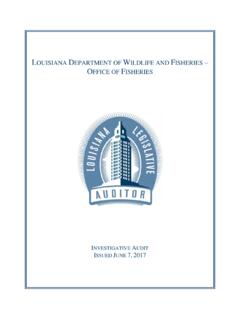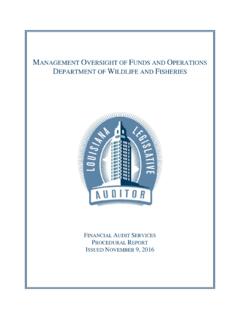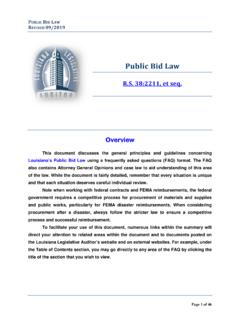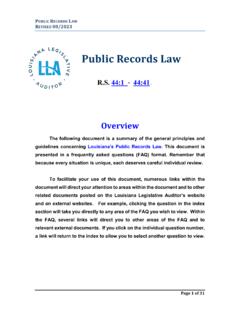Transcription of Open Meetings Law - app.lla.state.la.us
1 OPEN Meetings LAW REVISED 09/28/2021 Page 1 of 29 Open Meetings Law 42:11 42:28* *Formerly :13 Renumbered by the Louisiana Law Institute Pursuant to Act 861 of the 2010 Regular Session Overview The following document summarizes the general principles and guidelines concerning Louisiana s Open Meetings Law. This document is presented in a frequently asked questions (FAQ) format. While the document is fairly detailed, remember that every situation is unique and that each situation deserves careful individual review. To facilitate your use of this document, numerous links will direct your attention to related areas within the document and to other documents posted on the Louisiana Legislative Auditor s website and on external websites. For example, under the index section, you may go directly to any area of the FAQ by clicking the question you wish to view.
2 Within the FAQ, several links will direct you to other areas of the FAQ and to relevant external documents. If you click on the individual question number, you will link to the index in order to select another question to view. OPEN Meetings LAW REVISED 09/28/2021 Page 2 of 29 Index I. General 1. What is the Louisiana Open Meetings Law, and where is it found? 2. To whom does the Open Meetings Law apply? 3. What is a public body? 4. When is a private non-profit entity a public body for the purposes of the Open Meetings Law? 5. How should the Open Meetings Law be interpreted? 6. What is a meeting? 7. What is a Quorum? 8. What is a Walking Quorum? 9. What are the requirements of an Open Meeting? 10. Is the public allowed to participate in Open Meetings ? 11. Are public bodies required to give notice before they meet? 12. How should public bodies publish their notices for Meetings ?
3 13. What must be included in the meeting notice? 14. How are items listed on the agenda? 15. Can an agenda be changed prior to the meeting? 16. What are the procedures to add to or delete items from an agenda? 17. What is the procedure for public bodies to take up items on the agenda? 18. What is an extraordinary emergency? 19. How is written public notice given? 20. How are a public body s principal office and official journal determined? 21. Are public bodies required to keep minutes? 22. Are public bodies required to vote in any particular manner? 23. Must public bodies allow the recording of their Meetings ? OPEN Meetings LAW REVISED 09/28/2021 Page 3 of 29 24. May a public body meet on a legal holiday? 25. Are there any exceptions to the Open Meeting Requirements? 26. Is there a sample certification for a meeting conducted under the 42 emergency exception?
4 II. Executive Session 27. When may public bodies have closed executive sessions? 28. What are valid reasons for entering into executive session? 29. What are invalid reasons for entering into executive session? 30. What are prerequisites for a closed session to discuss an individual s character and fitness? 31. What is considered litigation for the purpose of closing a meeting? 32. What are the requirements for the State Mineral Board to close its Meetings ? 33. What are the requirements for a school board to close its meeting to discuss a student? III. Violations of Open Meetings Law 34. What happens if a public body violates the Open Meetings Law? 35. Who must enforce the Open Meetings Law? 36. What relief may be granted for violations? 37. Where may one initiate enforcement proceedings? 38. What is the maximum amount that can be assessed as a civil penalty for Open Meetings Law violations?
5 IV. Special Notice to Propose Taxes 39. What are the notice provisions regarding public Meetings to propose , increase, renew or continue taxes? OPEN Meetings LAW REVISED 09/28/2021 Page 4 of 29 V. Miscellaneous 40. What are the provisions regarding a public employer entering a collective bargaining agreement? 41. What is the notice requirement regarding a public hearing on municipal zoning regulations? 42. How is a special meeting called by a Lawrason Act municipality? VI. Attorney General Opinions OPEN Meetings LAW REVISED 09/28/2021 Page 5 of 29 I. General What is the Louisiana Open Meetings Law, and where is it found? 42:12 42:28 The Open Meetings Law, found in 42:12 42:28, regulates Meetings of public bodies. The Open Meetings Law is meant to ensure that decisions by the government are made in an open forum.
6 The Open Meetings Law operates in conjunction with Louisiana s Public Records Law to insure compliance with Article XII, Section 3 of the Louisiana Constitution s mandate that No person shall be denied the right to observe the deliberations of public bodies and examine public documents, except in cases established by law. The Open Meetings Law is designed to ensure state integrity and to increase the public s trust and awareness of its governing officials. The Legislature through 42:11 has designated the official short title as the Open Meetings Law. 42:11 states : To whom does the Open Meetings Law apply? 42:14 42:17 Louisiana s Open Meetings Law applies to the Meetings of any public body unless an express provision in 42:16, 42:17, or 42:18 allows the meeting to be closed. Open Meetings Law does not apply to judicial proceedings.
7 What is a public body? 42:13 A public body is a village, town, and city governing authority; parish governing authority; boards, such as school, port, or levee boards; any other state, parish, municipal, or special district boards, commissions, or authorities, as well as any of their political subdivisions if the body possesses policy making, advisory, or administrative functions. Any committee or subcommittee of any of these bodies is also a public body. Specifically, any municipal or parish government council ( , police jury or board of alderman), state board or commission, or board of a political subdivision that has a policy making, administrative, or advisory function is subject to the Open Meetings Law. The law also applies to any official committee of the public body that has been delegated any of these functions by the public body, or any unofficial committee or gathering of the body that consists of a quorum of the body.
8 OPEN Meetings LAW REVISED 09/28/2021 Page 6 of 29 AG Op. 10-0155 cites the LA Supreme Court s four factor test for determining an entity s status as public or private: (1) whether the entity was created by the legislature, (2) whether its powers were specifically defined by the legislature, (3) whether the property of the entity belongs to the public, and (4) whether the entity's functions are exclusively of a public character and performed solely for the public benefit [State v. Smith, 357 505 ( )]. For a court to determine that an entity is public, all four factors must be present. When is a private non-profit entity a public body for the purposes of the Open Meetings Law? Generally, a private, non-profit entity is not subject to the Open Meetings Law. However, there are instances, in certain limited circumstances, when a private non-profit entity is a public body for purposes of the Open Meetings Law.
9 Non-profit, private entities created by or on behalf of political subdivisions may be subject to the Open Meetings Law pursuant to La. 12 Other private, non-profit entities may be subject to the Open Meetings Law based on the nature and character of their activities. The Attorney General, in AG Op. No. 13-0043, states : "Jurisprudence has made it clear that the mere fact that an entity is a private non-profit does not mean that it can never be a public body for purposes of the Open Meetings Law, nor does the fact that an entity receives public money mean that it is a public body for purposes of the Open Meetings Law". The factors considered when determining whether a private non-profit entity is subject to the Open Meetings Law are as follows: (1) whether the entity performs a government function or performs a function which, by law, is entrusted to other public bodies; (2) whether the entity is funded by public money; and (3) whether the entity exercises policy-making, advisory, and administrative functions.
10 " The determination of whether a private, non-profit entity is a public body for the purpose of the Open Meetings Law is a fact specific question that must be answered on a case-by-case basis. See also, AG Op. No. 14-0169 How should the Open Meetings Law be interpreted? 42:12 According to 42:12(A), the Open Meetings Law should be construed liberally. This means that if there is a question as to interpretation of a provision the entity should provide as much access/openness as possible. The Open Meetings Law operates with a general premise that all Meetings of public bodies should be open OPEN Meetings LAW REVISED 09/28/2021 Page 7 of 29 to the public. The burden, therefore, is on the individual seeking to engage in closed Meetings to prove that an exception applies allowing the closing of the meeting. What is a meeting? 42: 13 A meeting is a convening of a quorum of a public body to deliberate or act on a matter that the public body has supervision, control, jurisdiction, or advisory power over.












